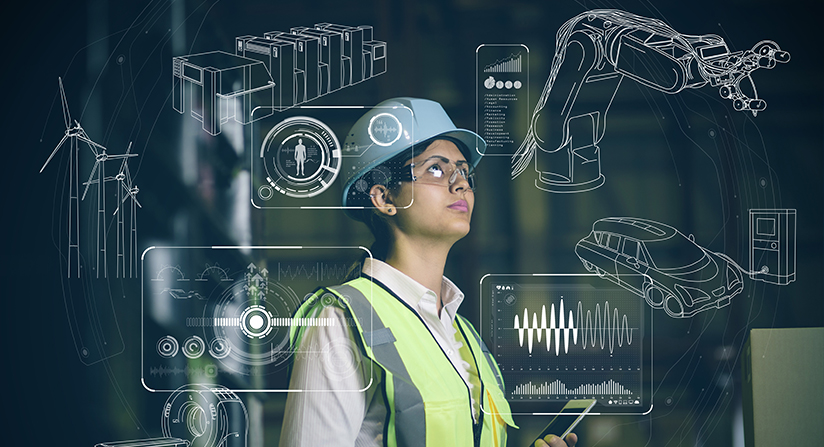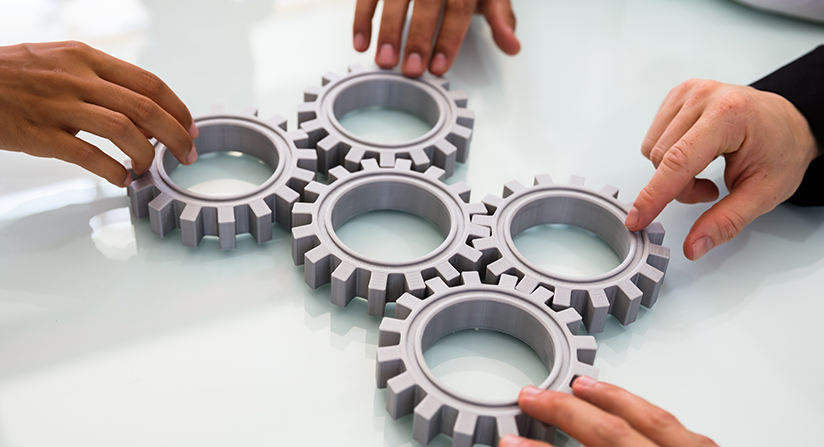Technology is the enabler of industrial advancements!
According to IDC predictions, by the year 2020, 60% of manufacturers will depend on digital platforms which may help them increase their overall bottom-line by 30%.
Doesn’t it sound amazing?
Gone are those days when manufacturing was labor-intensive. Over the past few years, the definition of manufacturing has changed immeasurably. Now it is all about a sophisticated, intelligent set of IT-based processes and tools which encourage smart manufacturing and a cognitive environment.
Klaus Schwab, a German engineer and economist, has explicitly articulated in his book (The Fourth Industrial Revolution) that we have entered the era of the fourth industrial revolution. The first industrial revolution happened in the late 1700s when factories were given the utmost importance. The second was in the 20th century – automobiles. And then the 3rd industrial revolution – computers.
With each industrial revolution, products were manufactured faster, more precisely, and consistently. Industry 4.0 fosters the smart factory, encouraging technologies such as the Internet of Things, Blockchain, Artificial Intelligence, Machine Learning, Virtual Reality, Augmented Reality, and more.
This is a smart world and every manufacturer supports the fact that the quality of products defines the success of a business for customers (as per a recent IQMS survey). Accurate, well-informed, and real-time collaboration with employees 24/7 will drive the most efficient path to growth and productivity.
Today, IoT-enabled cyber-physical systems communicate with each other in real-time across the organization. Big Data analytics, robotics, etc. also ensure a higher level of accuracy in the supply chain and minimize order delays.
Industry 4.0
Industry 4.0 is the scenario of today’s industrial world. Here are a few aspects that make this a ‘game changer’:
- Transparency of information – A virtual copy of physical files or data is saved online to smooth workflow
- Interoperability – Machines and sensors are connected to a central data center and aggregated for improved processes, performance, and planning.
- Decentralized and informed decision making – Helps managers evaluate tasks and operations efficiently, without wasting time and money
- Technical assistance to users – Reduces human efforts by offering high-end technology tools for departments
Now, here are some of the emerging trends that will nurture industry 4.0 and change the way businesses work.
- Advanced robots
Robots are changing the definition of the manufacturing process. The robot is a computer programmable machine that is designed to accomplish a series of complex tasks automatically. Guided by the external controlling device or a device within, a robot can assemble, dispense, handle processing and welding, inspect equipment and carry out difficult tasks easily.
Robots such as Sophia, Atlas, Asimo by Honda, iCub, PETMAN, and Nao are names of a few intelligent robots which are at the forefront of this robotics revolution. These robots can perform activities, recognize postures, and walk on rough terrain without breaking a sweat. A set of sensors, dexterous hands, and ultimate maneuverability make them impressive humanoid robots.
- Additive manufacturing
Commonly known as 3D printing, additive manufacturing is the process of creating physical three-dimensional objects directly from the computer’s digital design. Here, three-dimensional objects are synthesized using layering of these materials – ceramics, composites, metal powder, glass, and even edibles such as chocolate.
Simply stated, additive manufacturing involves the creation of complex products by a layering of materials. Components that are exposed to high pressures can be produced with this manufacturing process, using cobalt-chromium powder. Industries such as aerospace, medical, automotive, energy, and consumer products industries are highly leveraging additive manufacturing technology so that they can work with utmost precision to beat the competition.
- Augmented Reality
The word augmented means enhanced. Augmented reality is an enhanced reality where graphics, sound, touch feedback, and actions are added to the natural environment with the help of superimposed computer-generated images. This changes the way we look at the world and creates enhanced user experiences.
Augmented reality offers an immersive, step-by-step instruction guide for technicians who work on the shop floor. Your staff members can see a visualization of the internal components of machines. This will enhance the learning experience, save time and cost by reducing unneeded resources.
AR applications help you optimize the production process through the early fusion of real and virtual reality. It encourages the accuracy and evaluation of virtual plans in a real environment.
- Simulation
Simulation is known to be the second-largest innovation and management science used by manufacturing managers. Simply put, it is the careful use of software to make computer models of manufacturing units. This helps to evaluate the manufactured systems and obtain vital information.
Here are a few benefits of simulation in manufacturing – calculation of optimal resources required, time spent in the system by parts, time spent during transportation, percent utilization of machines and workers, and it supports just-in-time manufacturing. These are just a few of the many advantages of simulation which helps manufacturers grow and evolve.
- Cloud cybersecurity
With better data collection techniques and cloud-enabled digital tools, manufacturers can view real-time social and analytics data 24/7.
94% of businesses claimed that they saw an improvement in data security after migrating to the cloud. 91% of them conveyed that the cloud makes it easier to meet business compliance requirements.
Cloud technology has completely changed the definition of remote working. It allows employees to collaborate, communicate, brainstorm, and make wise decisions from anywhere in the world.
Cybersecurity protects internet-connected systems (software, hardware, data) from malicious cyber-attacks like Ransomware. It eliminates unrequired data access so that only the concerned people can view, edit, and manage data.
SAP is a pioneer of innovation. With vision and insights, SAP has created the most amazing cloud services that can help your organization flourish like never before. Some of these cloud and web services include object detection: validating photos on health insurance cards, image feature extraction: identify similarities and more.
- Big data and analytics
Data volume doubles every two years. Presently, companies like IBM and SAP have created cutting-edge analytics tools which include a huge array of analytics capabilities such as data discovery and visualization, business intelligence, planning, and predictive analytics.
With the growing volume of data every day, manufacturers must have fast and actionable insights and a multi-cloud environment to address every challenge head-on.
Let’s see how big data as technology helps modern manufacturers:
- It provides the ability to track the exact location of products
- It allows you to predict and forecast customer demand
- It enables tracking of machines and resources to improve efficiency
- It monitors daily production capabilities
Conclusion
As manufacturing processes are evolving at a rapid pace, it has become crucial for businesses to leverage these innovations to get timely insights into business needs. It lets you manage and analyze your large volume of data in a hassle-free manner while automating tasks. This saves time, secures data, and improves product quality.
Technologies and trends like blockchain, simulation, agile manufacturing, cloud, AR, robotics, etc. are uncovering new growth opportunities for global businesses. To know more, please visit https://www.optiproerp.com/ .
About OptiProERP
OptiProERP is a suite of business management modules that includes production management, CRM, Quality Control, Supply Chain Management, and more. It’s a manufacturing ERP solution designed to help your business succeed now and into the future.
Follow Us










